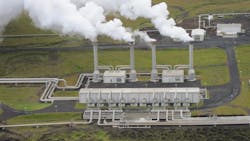Global Geothermal Alliance Launched with Support of 36 Countries
Thirty-six countries gave the official start on Dec. 7 to an initiative to promote geothermal energy in developing economies as a cleaner alternative to oil, gas and coal.
The Global Geothermal Alliance, launched on the sidelines of the UN climate talks in Le Bourget, aims at a sixfold increase in geothermal electricity production and a tripling of geothermal-derived heating by 2030.
At present, geothermal is growing modestly, at three to four percent per year, providing 12 gigawatts of electricity annually.
But this just a fraction of its overall potential of 100 gigawatts, according to the industry. Only 24 out of 90 countries with geothermal potential actually use the resource.
The alliance said its members will seek to overcome "political uncertainty" about geothermal and strengthen the industry's skills base.
The Global Geothermal Alliance initiative was sketched out in September 2014 at a summit organized by UN Secretary General Ban Ki-moon. Members include countries on thermal "hotspots" in Africa, Southeast Asia and Latin America, ranging from Kenya and Tanzania to Malaysia, the Philippines and Guatemala.
Geothermal energy entails drilling into hot rock and using the heated water to generate electricity or provide heating for communities.
It is considered exceptionally clean, as the heat extraction process requires far lower emissions of carbon dioxide (CO2) compared with fossil fuels.
Learn More About the IndustryWeek Daily News Update
It is also deemed sustainable, given the almost limitless source of the energy, although individual wells can cool down or run out of water.
Obstacles to geothermal are the high cost of drilling and risks entailed in the exploration phase.
"Geothermal energy development particularly in developing countries faces important challenges," the alliance said.
"Due to risks related to geological drilling during the exploration phase, along with the associated costs, financing the early stage of the process is limited to investors that understand and accept the possible associated risks."
Copyright Agence France-Presse, 2015
About the Author
Agence France-Presse
Copyright Agence France-Presse, 2002-2025. AFP text, photos, graphics and logos shall not be reproduced, published, broadcast, rewritten for broadcast or publication or redistributed directly or indirectly in any medium. AFP shall not be held liable for any delays, inaccuracies, errors or omissions in any AFP content, or for any actions taken in consequence.
